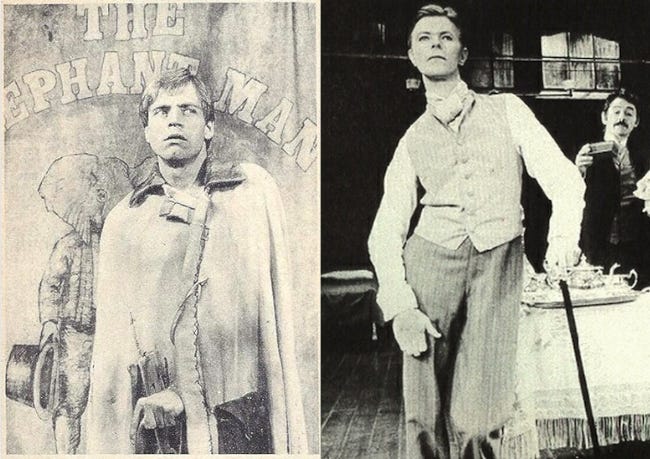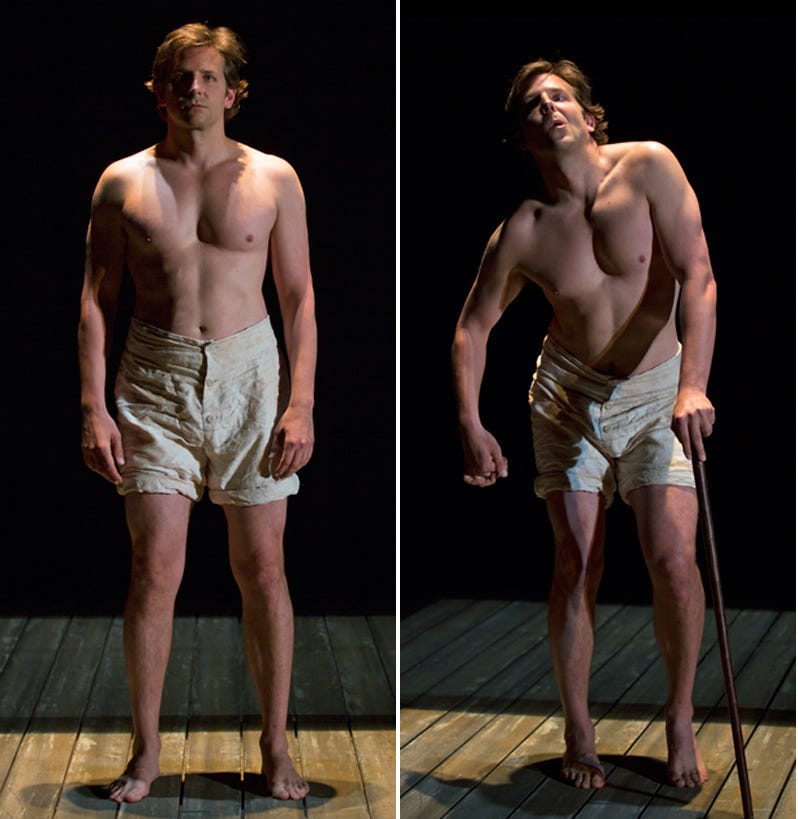On February 19, 2014, American movie star Bradley Cooper visited The Tonight Show with Jimmy Fallon to promote his new revival of The Elephant Man on Broadway. Cooper had not yet become Jackson Maine and was three weeks out from losing yet another Academy Award for yet another David O. Russell movie, this time to fellow totally normal person Jared Leto in a totally normal and unproblematic performance that has definitely not aged like rotten fruit. By 2014, Cooper had moved on from his Alias days (peak) and his career had somehow survived an entire Hangover trilogy only for him to emerge out the other side as a more-than-slightly intense and deeply sincere guy who was OK with laughing at himself so long as we knew doing so hurt his feelings. But he was game, I promise. But you should know this wasn’t a game to him. …But it’s cool, don’t worry about it!
The thing about the play The Elephant Man is that since it premiered in London in 1977 it has always featured a lead performance stripped of any character makeup or prosthetics; it is a story about a famously deformed man in which the deformity is translated purely via ~imagination~. The great David Schofield originated the role, but between its initial runs on Broadway and the West End, both David Bowie and Mark Hamill took a stab, the latter closing out the show’s final three weeks at the Booth Theatre between releasing The Empire Strikes Back and heading to Endor Redwood National Park to film Return of the Jedi. The show was dormant for 40 years until a 2002 revival with Billy Crudup contorting his way through it—and then finally, in 2014, 15 years after he first performed The Elephant Man for his masters thesis at the Actors Studio, major movie star and very chill dude Bradley Cooper gave it a go, immediately raising a very important question: what would it be like to perform The Elephant Man without prosthetics—which is, again, the only way it has ever been done—in the age of the internet?
Would you be surprised to hear that the answer to this question arrived very loudly and quickly? I remember the photos of Cooper’s Elephant Man interpretation hitting Twitter like it was yesterday; in many ways they continue to loom large over my understanding of his whole thing (very Serious, very Earnest, very Committed to the Bit, weirdly very Fun to Root For). It seemed insane that he was choosing to play Joseph Merrick, the titular Elephant Man, this way, and everyone understood immediately, really without even needing to say anything, that Bradley Cooper himself had personally fought for this production to happen. It wasn’t clear to the layperson—especially not to the laytweeter circa 2014—that every Merrick interpreter plays the role stripped down, but even with that understanding check out Cooper’s Merrick compared to Hamill’s and Bowie’s:
I think it’s the face that does it. You can’t just make a face like this and expect the audience to get on your side. More so than that, though, of course (we’re talking about Bradley Cooper here), is the way that Cooper talked in the press about his performance as Merrick and his connection to the role. Like this interview in Playbill, for example:
[Cooper] connected so strongly for several reasons beyond Lynch's masterful storytelling. As a volunteer at a nearby school for disabled children, he says, "I knew what it was like for children who don't quite look like other kids."
Additionally, while Cooper has become a sex symbol, he says he never thought that way. One "odd connection" is that Cooper's issues with posture (one hip lower than the other) and the hole he has in his right ear are milder parallels of some of Merrick's problems.
“Milder parallels.” For the record, here is Joseph Merrick, photographed a year before he died at 27 years old:
I understand that actors oftentimes need to find anchors in a character they’re playing to help them get situated more fully in the reality of it all, but since graduating from good actor to Serious Artist, Cooper has repeatedly said far more when way less would have worked just fine. I’m tip-toeing around his Maestro press tour because I think that movie is a sorely misunderstood masterpiece, but remember when he said he spent six years learning to conduct or whatever? Or even just the way he insisted on calling Bernstein “Lenny” in every interview? None of these things are inherently wrong, in my opinion, but I’m definitely not surprised that they annoy people in the modern age. (And ftr I do think it’s wrong to say you understand a character with facial and bodily deformities because you volunteer with disabled children…just…OK.)
So February 19, 2014. Bradley Cooper visits The Tonight Show, hot off the second of what over the course of the next ten years would become a staggering twelve winless Academy Award nominations (Jackson Maine robbed). After a little banter and a bit where they put on costume shop wig-visors, Fallon and Cooper turn to The Elephant Man. Fallon, infamous for his vacuousness, hadn’t yet turned the corner from “basically harmless” to “actively evil” (2016 took many casualties) and the ten minutes that follow with Cooper immediately enter into the canon of batshit late night show interviews. To call it an interview is in fact disingenuous: the two men lather themselves into laughing fits so unstoppable they can barely get five words out. The wigs aren’t helping, but it does seem to stem mostly from Cooper, who feels a very deep importance in his new Broadway revival of Merrick’s story—one that he’s been wanting to bring to the stage since he was a child—but perhaps because of the importance he’s imbued it with he can’t figure out how to enter normally into the conversation. “This is serious, this is serious,” he keeps saying, both internally to himself and aloud to whoever will listen, but the seriousness only heightens the absurdity of his situation: he is talking about Joseph Merrick, the famously tragic “Elephant Man,” with a millionaire clown on national television.
Maybe there’s no place for serious conversations in late night, and that’s fair—it’s a bit like showing up to a baby shower and telling everyone that your mother died researching spiders in the Amazon and you still resent her for it. A clip has been going around this week of Demi Lovato discussing her experience as a child star and how severe disassociation stemming from abuse feeds lifelong trauma…then the camera cuts to a wide and Jimmy Fallon is nodding somberly with goggles on his head and purple gak all over his face. Is this his fault? Is it anyone’s? Even on the best days, hosting a show like this seems like it sucks (and he is especially bad at it) and any time someone with like 10% more panache is able to get a truly meaningful conversation out of it (Colbert and Keanu come to mind), it seems like a miracle. For Bradley Cooper in 2014 (and 2015, and 2019, and 2023—there’s a whole 30-minute compilation of him unable to stop laughing on The Tonight Show), it seems like the absurdity of the attempt at any level of reality in this specific context with this specific material to promote completely overtakes him. Plus I just think he’s a little weirdo <3
Do we think The Elephant Man should ever come back to Broadway, at least in the iteration it’s always taken? Earlier this week we went to see an early showing of A Different Man with a Q&A after with writer-director Aaron Schimberg. A Different Man tells the story of a severely facially deformed man who undergoes science fiction corrective surgery and finds he’s finally able to live the kind of “easy” life he’s always dreamed of (big apartment, sex with hotties, high powered real estate job). When it turns out someone from his past life is putting on an off-Broadway play about a character based on the man he used to be, he auditions for and gets the lead role, despite now looking like famous actor Sebastian Stan. And thus begins a twisty, unpredictable, and very funny investigation into the nature of art, interpretation, and self-loathing, with a star-making turn from the explosively magnetic Adam Pearson (who you may remember from his breakout in Under the Skin).
Listening to Schimberg discuss how this story came from his own experience maneuvering through the modern world with a cleft palette was fascinating and, as a lot of these things go, really helpful for unpacking the intent behind so many of the movie’s narrative choices. Schimberg, having made two movies now about living with physical deformity, also called out other films in the long, knotty history of depicting so-called “freaks” on screen (including, obviously, Tod Brown’s Freaks). One of these was David Lynch’s The Elephant Man, a movie I watched for the first time specifically in preparation for A Different Man and found deeply, painfully empathetic, thanks to Lynch’s dignified camera and John Hurt’s astonishing central performance. The Elephant Man is almost 45 years old now, and I hope no one ever thinks to remake it (the BBC cast Stranger Things’ Charlie Heaton in a 2-part miniseries in 2018, but it seems like the project was immediately scrapped once disabilities advocates rallied against it)—it’s an interpretation of Merrick’s story that works specifically because of its staginess and antiquated tone, but maybe most importantly because of its commitment to recreating Merrick as he truly was and not as our minds can safely imagine him to be while still looking at a conventionally attractive man fake-limping across a stage. It’s not perfect—it’s still facsimile—but it’s a middle ground that does what storytelling should do: convince us, and in convincing us, make us feel.
It’s definitely not my place or intent to agree or disagree with Schimberg, who’s quick take on the film seemed to be that it’s great if still exploitative, but I love that it came up in a conversation about the way we tell other peoples’ stories. Beyond “who should be able to do that,” there lies another, much thornier question: and how? Is there a wrong way, even if you’re the right person? And if you choose one path, are you committing yourself to it all the way? For Bradley Cooper I think these questions are no-brainers (no; yes; yes), and this is what makes him one of our most maniacal geniuses—and one of our favorites to watch unravel.
The brilliant A Different Man is in theaters now. Whatever Bradley Cooper has got cooking I sure can’t wait to see it.
Movies I have been watching: Eraserhead and The Elephant Man (trying so hard to learn to love David Lynch); Teenage Mutant Ninja Turtles: Mutant Mayhem (great!); Rosemary’s Baby (basically a first watch for me if you can believe it—Cassavetes is so scary); Look Into My Eyes (loved this new doc about NYC psychics and their clients); Beetlejuice (masterpiece) and Beetlejuice Beetlejuice (perfectly fine, I guess); Here (the moss movie, not the AI Tom Hanks one); Coraline (3D re-release); Whiplash, La La Land, and First Man (Chazelle rewatch weekend last week for no reason—I love all these movies, sorry); Twisters (4DX, which is fucking unreal, even more fun than you might expect I promise); Simply Irresistible (Film Fest season 4 records have begun!!); A Different Man (at BAM); Daisies (enjoyed watching it, but really enjoyed reading about it after)







bradley cooper is one of the funniest living men
that cooper/fallon interview is one of my favorite things of all time and the aspect of cooper people forget and maybe he also forgets even tho it's so inherent to his star persona, like he's just a laffer
was surprised to be as moved as i was by lynch's elephant man... still thinking about it...